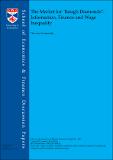Files in this item
The market for 'rough diamonds' : information, finance and wage inequality
Item metadata
| dc.contributor.author | Koutmeridis, Theodore | |
| dc.date.accessioned | 2013-09-26T14:31:06Z | |
| dc.date.available | 2013-09-26T14:31:06Z | |
| dc.date.issued | 2013-10 | |
| dc.identifier | 58454547 | |
| dc.identifier | 1cbcb039-001b-4961-b22f-0cc505f78ba2 | |
| dc.identifier.citation | Koutmeridis , T 2013 ' The market for 'rough diamonds' : information, finance and wage inequality ' School of Economics & Finance Discussion Paper 1307 , no. 1307 , University of St Andrews . | en |
| dc.identifier.issn | 0962-4031 | |
| dc.identifier.uri | https://hdl.handle.net/10023/4066 | |
| dc.description.abstract | During the past four decades both between and within group wage inequality increased significantly in the US. I provide a microfounded justification for this pattern, by introducing private employer learning in a model of signaling with credit constraints. In particular, I show that when financial constraints relax, talented individuals can acquire education and leave the uneducated pool, this decreases unskilled inexperienced wages and boosts wage inequality. This explanation is consistent with US data from 1970 to 1997, indicating that the rise of the skill and the experience premium coincides with a fall in unskilled-inexperienced wages, while at the same time skilled or experienced wages remain flat. The model accounts for: (i) the increase in the skill premium despite the growing supply of skills; (ii) the understudied aspect of rising inequality related to the increase in the experience premium; (iii) the sharp growth of the skill premium for inexperienced workers and its moderate expansion for the experienced ones; (iv) the puzzling coexistence of increasing experience premium within the group of unskilled workers and its stable pattern among the skilled ones. The results hold under various robustness checks and provide some interesting policy implications about the potential conflict between inequality of opportunity and substantial economic inequality, as well as the role of minimum wage policy in determining the equilibrium wage inequality. | |
| dc.format.extent | 62 | |
| dc.format.extent | 1246399 | |
| dc.language.iso | eng | |
| dc.publisher | University of St Andrews | |
| dc.relation.ispartofseries | School of Economics & Finance Discussion Paper 1307 | en |
| dc.subject | Wage inequality | en |
| dc.subject | Experience premium | en |
| dc.subject | Skill premium | en |
| dc.subject | Employer learning | en |
| dc.subject | Signaling | en |
| dc.subject | Financial constraints | en |
| dc.subject | Minimum wages | en |
| dc.subject | HB Economic Theory | en |
| dc.subject | SDG 8 - Decent Work and Economic Growth | en |
| dc.subject | SDG 10 - Reduced Inequalities | en |
| dc.subject.lcc | HB | en |
| dc.title | The market for 'rough diamonds' : information, finance and wage inequality | en |
| dc.type | Working or discussion paper | en |
| dc.contributor.institution | University of St Andrews. School of Economics and Finance | en |
| dc.identifier.url | http://ideas.repec.org/p/san/wpecon/1307.html | en |
| dc.identifier.url | http://www.st-andrews.ac.uk/economics/repecfiles/4/1307.pdf | en |
This item appears in the following Collection(s)
Items in the St Andrews Research Repository are protected by copyright, with all rights reserved, unless otherwise indicated.

